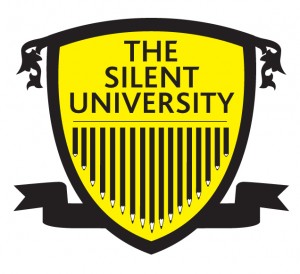The Silent University
The Silent University is an solidarity based knowledge exchange platform by displaced people and forced migrants. It is led by a group of lecturers, consultants and research fellows.
It’s an education platform outside of the restrictions of migration laws, language limitations and the other bureaucratic obstacles.
Since 2012 the Silent University has involved those that have had a professional life and academic training in their home countries, but are unable to use their skills or professional training due to a variety of reasons related to their status.
Founded in 2012 currently has active branches in Sweden and Germany. Previously it had branches in Amman, Athens, London, Hamburg and Copenhagen. Currently a new branch is being formed in Turkey. Main motivation is the belief that everybody has the right to educate and that systemic failure is no excuse to outlaw those who are seeking asylum. In order to establish this goal, they offer transversal pedagogical programs led by lecturers, consultants and research fellows who are displaced people and forced migrants. The platform operates without language limitations or bureaucratic obstacles.
- Everybody has the right to educate.
- Immediate acknowledgement of academic backgrounds
- of asylum seekers and refugees.
- Acting knowledge without Language limitations.
- Acting knowledge without legal limitations.
- Participatory modes of usership.
- Artistic pedagogical practices need to be emancipated from commonly used terminologies such as "projects" and "workshops".
- Pedagogic practices must be based on long-term engagement, commitment and determination.
- We act in solidarity with other refugee struggles and collectives around the world.
- Extra-territorial, trans-local knowledge production and conflict urbanism must be priorities.
- Decentralized, participatory, horizontal and autonomous modality of education, instead of centralized, authoritarian, oppressive, and compulsory education.
- Acting beyond limitations of border politics.
- Adhocracy instead of bureaucracy.
- Action Knowledge can only be produced through assemblage methods.
- Revolution of decolonising pedagogies
